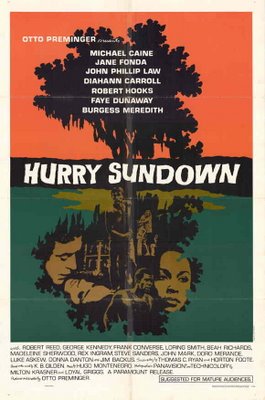 HURRY SUNDOWN (1967)
HURRY SUNDOWN (1967) Cast: Michael Caine (Henry Warren), Jane Fonda (Julie Ann Warren), John Phillip Law (Rad McDowell), Diahann Carroll (Vivien Thurlow), Robert Hooks (Reeve Scott), Faye Dunaway (Lou McDowell), Burgess Meredith (Judge Purcell), Robert Reed (Lars Finchley), George Kennedy (Sheriff Coombs), Frank Converse (Clem De Lavery), Loring Smith (Thomas Elwell).
Crew: Otto Preminger (director and producer), Thomas C Ryan and Horton Foote (writers), Hugo Montenegro (music), Milton Krasner and Loyal Griggs (cinematography), Louis R Loeffler and James D Wells (editors), Gene Callahan (production designer).
Synopsis: Georgia farmer Rad McDowell returns home after serving in the Second World War. A new development has bought up all the surrounding land, except for the farms owned by Rad and his black neighbours, Rose Scott and her son Reeve. Rad refuses to sell his land, endangering a deal brokered by his ambitious cousin, Henry Warren. Rad is unhappy that his eldest son, Charles, is close to Henry. Henry sends his wife Julie to persuade Rose, who was her nanny years earlier. But Rose refuses and dies of a heart attack. Reeve and Rad form an alliance to improve their land by blasting irrigation channels. Henry’s troubled son Colie seriously injures himself while Henry tries to stop the blasting. Henry blames Reeve for the injury and tries to have the black farmer evicted, enlisting Julie’s help. The case goes to court where a bigoted judge sides with Henry. But Rad provides documents that prove Reeve owns the disputed land. Julie discovers Henry lied about the cause of Colie’s injury. She decides to divorce Henry. Determined to get revenge, he plants explosives above Rad’s farm. But Charles is accidentally killed in the blast. Henry runs away, distraught. The local black community helps Rad reclaim his flooded land…
Hurry Sundown was originally a thousand-page novel by K. B. Gilden, first published as two volumes in 1964. Noted director/producer Otto Preminger acquired the film rights and commissioned screenwriters Thomas C Ryan and Horton Foote to adapt the sprawling epic. Preminger made a surprising choice for the leading role, casting London-born Caine as Southern bigot Henry Warren. The filmmaker approached him while Caine was in Hollywood shooting Gambit (1966) with Shirley MacLaine.
Mastering a Southern accent proved challenging for Caine. Preminger sent him voice tapes to practise with while the actor was working on Funeral in Berlin (1966). As soon as Caine finished the second Harry Palmer picture, he was flown to Louisiana to start work on Hurry Sundown. British journalist David Lewin visited the set and interviewed the leading man. Caine said he was not afraid playing a racist would harm his public image. ‘What I do is show the sadness of the man… The sadness of a man who destroys others and destroys himself. Nazis and racialists are yesterday’s news. Everyone knows about them. I just feel sad for them.’
The production used black and white actors. This caused problems during filming in Louisiana, where the civil rights movement was making headlines. The cast and crew had to be guarded by policemen and state troopers to protect them from the racist Ku Klux Klan organisation. One hotel initially refused to let black and white actors use the same swimming pool, until Preminger threatened to move everyone to another hotel. In the dining room black actors were insulted by other guests. Crew members were threatened with guns and production vehicles had tyres slashed. ‘We live in the compound of the hotel,’ Caine told Lewin. ‘It is like a stockade with armed guards on patrol.'
Austrian-born director Preminger was infamous for his fiery temper, but the leading man did not have problems. ‘Otto was nice to me on Hurry Sundown but I didn’t like how nasty he was to everyone else,’ Caine told Time Out magazine in 1992. ‘He was particularly nasty to Faye Dunaway and I pulled him up on it. My attitude was if he says anything to me I’ll fucking deck him.’ Dunaway was making her movie debut on this picture.
Hurry Sundown opened in America during February 1967, attracting positive reviews. Critics were full of praise for Caine’s Southern accent. In Britain reaction to the A-rated movie was less favourable, with Caine taking a drubbing from UK critics. Reviewers seemed unable or unwilling to see the actor as anything other than his Cockney public persona. A similar situation arose more than 30 years later when Caine adopted a New England accent for his role as Dr Larch in The Cider House Rules (1999).
Hurry Sundown has never been released on VHS or DVD in the UK. A brief clip from it appears as part of a flashback sequence in Austin Powers in Goldmember (2002)
Reviews: ‘Melodrama on a grand scale … performances are swamped by a script like this. Michael Caine, despite a fair shot as a Southern drawl, is way out of his depth.’ – MFB
‘Otto Preminger has created an outstanding, tasteful but hard-hitting, and handsomely-produced film about racial conflict in Georgia circa 1945 … Michael Caine leads the stars, and delivers an excellent performance…’ – Variety
Verdict: They don’t make them like this anymore. Hurry Sundown is a sprawling, melodramatic epic about racism where everything is writ large. The bad people are very bad and the good are very good, verging on the saintly. The contrast is so stark, it leaves little room for subtlety. A painfully slow first hour puts all the pieces in place, before events build to a series of unconvincing climaxes. Caine’s Southern accent isn’t bad, it just sounds odd coming from his mouth. Despite this, he gives a solid performance in an unsympathetic part. Hurry Sundown is best viewed for its curiosity value. How many films can you see where Jane Fonda simulates fellatio on a saxophone to arouse Michael Caine?
No comments:
Post a Comment